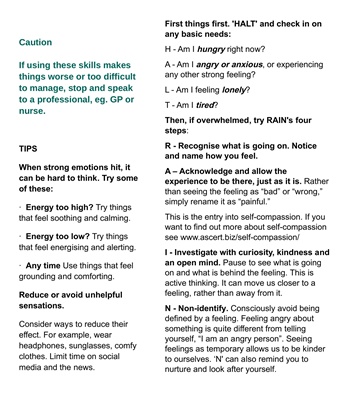
Click here
Caution
If using these skills makes
things worse or too difficult to
manage, stop and speak to a
professional, eg. GP or nurse.
First things first. 'HALT' and check in on
any basic needs:
H - Am I hungry right now?
A - Am I angry or anxious, or experiencing
any other strong feeling?
L - Am I feeling lonely?
T - Am I tired?
Then, if overwhelmed, try RAIN's four
steps:
R - Recognise what is going on. Notice
and name how you feel.
A - Acknowledge and allow the
experience to be there, just as it is. Rather
than seeing the feeling as "bad" or "wrong,"
simply rename it as "painful."
This is the entry into self-compassion. If you
want to find out more about self-compassion
see www.ascert.biz/self-compassion/
I - Investigate with curiosity, kindness and
an open mind. Pause to see what is going
on and what is behind the feeling. This is
active thinking. It can move us closer to a
feeling, rather than away from it.
N - Non-identify. Consciously avoid being
defined by a feeling. Feeling angry about
something is quite different from telling
yourself, "I am an angry person". Seeing
feelings as temporary allows us to be kinder
to ourselves. 'N' can also remind you to
nurture and look after yourself.
TIPS
When strong emotions hit, it can be
hard to think. Try some of these:
· Energy too high? Try things that feel
soothing and calming.
· Energy too low? Try things that feel
energizing and alerting.
· Any time Use things that feel
grounding and comforting.
Reduce or avoid unhelpful
sensations.
Consider ways to reduce their effect.
For example, wear headphones,
sunglasses, comfy clothes. Limit time
on social media and the news.